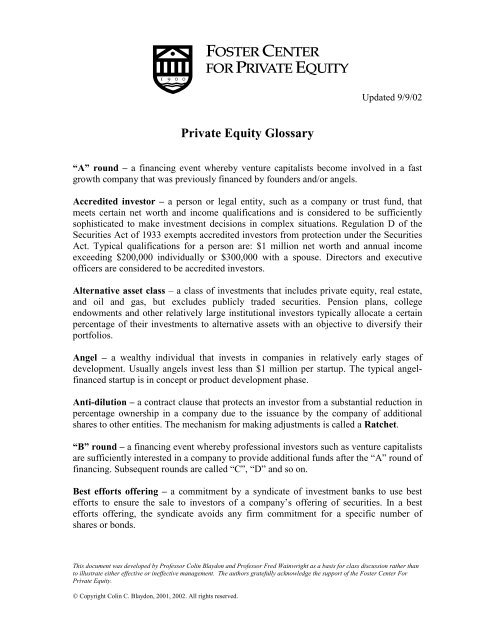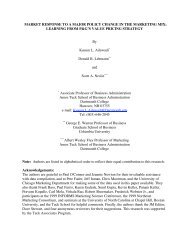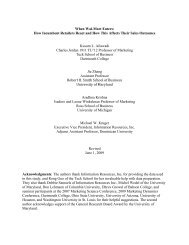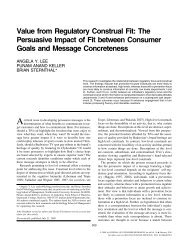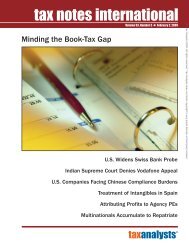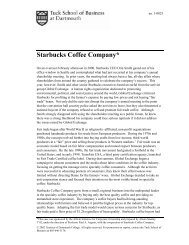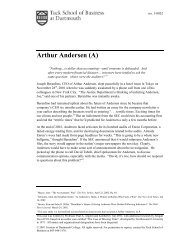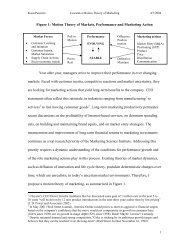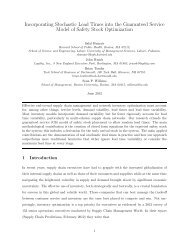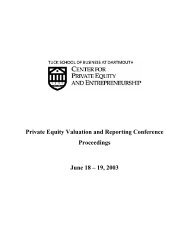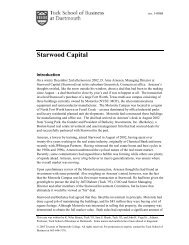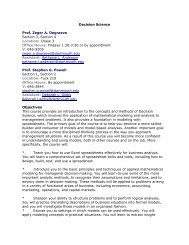Private Equity Glossary - Tuck School of Business
Private Equity Glossary - Tuck School of Business
Private Equity Glossary - Tuck School of Business
You also want an ePaper? Increase the reach of your titles
YUMPU automatically turns print PDFs into web optimized ePapers that Google loves.
This document was developed by Pr<strong>of</strong>essor Colin Blaydon and Pr<strong>of</strong>essor Fred Wainwright as a basis for class discussion rather than<br />
to illustrate either effective or ineffective management. The authors gratefully acknowledge the support <strong>of</strong> the Foster Center For<br />
<strong>Private</strong> <strong>Equity</strong>.<br />
© Copyright Colin C. Blaydon, 2001, 2002. All rights reserved.<br />
<strong>Private</strong> <strong>Equity</strong> <strong>Glossary</strong><br />
Updated 9/9/02<br />
“A” round – a financing event whereby venture capitalists become involved in a fast<br />
growth company that was previously financed by founders and/or angels.<br />
Accredited investor – a person or legal entity, such as a company or trust fund, that<br />
meets certain net worth and income qualifications and is considered to be sufficiently<br />
sophisticated to make investment decisions in complex situations. Regulation D <strong>of</strong> the<br />
Securities Act <strong>of</strong> 1933 exempts accredited investors from protection under the Securities<br />
Act. Typical qualifications for a person are: $1 million net worth and annual income<br />
exceeding $200,000 individually or $300,000 with a spouse. Directors and executive<br />
<strong>of</strong>ficers are considered to be accredited investors.<br />
Alternative asset class – a class <strong>of</strong> investments that includes private equity, real estate,<br />
and oil and gas, but excludes publicly traded securities. Pension plans, college<br />
endowments and other relatively large institutional investors typically allocate a certain<br />
percentage <strong>of</strong> their investments to alternative assets with an objective to diversify their<br />
portfolios.<br />
Angel – a wealthy individual that invests in companies in relatively early stages <strong>of</strong><br />
development. Usually angels invest less than $1 million per startup. The typical angelfinanced<br />
startup is in concept or product development phase.<br />
Anti-dilution – a contract clause that protects an investor from a substantial reduction in<br />
percentage ownership in a company due to the issuance by the company <strong>of</strong> additional<br />
shares to other entities. The mechanism for making adjustments is called a Ratchet.<br />
“B” round – a financing event whereby pr<strong>of</strong>essional investors such as venture capitalists<br />
are sufficiently interested in a company to provide additional funds after the “A” round <strong>of</strong><br />
financing. Subsequent rounds are called “C”, “D” and so on.<br />
Best efforts <strong>of</strong>fering – a commitment by a syndicate <strong>of</strong> investment banks to use best<br />
efforts to ensure the sale to investors <strong>of</strong> a company’s <strong>of</strong>fering <strong>of</strong> securities. In a best<br />
efforts <strong>of</strong>fering, the syndicate avoids any firm commitment for a specific number <strong>of</strong><br />
shares or bonds.
Beta Product – a product that is being tested by potential customers prior to being<br />
formally launched into the marketplace.<br />
Blow-out round – see Cram-down round.<br />
Board <strong>of</strong> directors – a group <strong>of</strong> individuals, typically composed <strong>of</strong> managers, investors<br />
and experts, which have a fiduciary responsibility for the well being and proper guidance<br />
<strong>of</strong> a corporation. The board is elected by the shareholders.<br />
Boat anchor – a person, project or activity that hinders the growth <strong>of</strong> a company.<br />
Book – see <strong>Private</strong> placement memorandum.<br />
Bootstrapping – the actions <strong>of</strong> a startup to minimize expenses and build cash flow,<br />
thereby reducing or eliminating the need for outside investors.<br />
Bridge financing – temporary funding that will eventually be replaced by permanent<br />
capital from equity investors or debt lenders. In venture capital, a bridge is usually a<br />
short term note (6 to 12 months) that converts to preferred stock. Typically, the bridge<br />
lender has the right to convert the note to preferred stock at a price that is a 20% discount<br />
from the price <strong>of</strong> the preferred stock in the next financing round. See Wipeout bridge<br />
and Hamburger Helper bridge.<br />
Broad-based weighted average ratchet - a type <strong>of</strong> anti-dilution mechanism. A weighted<br />
average ratchet adjusts downward the price per share <strong>of</strong> the preferred stock <strong>of</strong> investor A<br />
due to the issuance <strong>of</strong> new preferred shares to new investor B at a price lower than the<br />
price investor A originally received. Investor A’s preferred stock is repriced to a<br />
weighted average <strong>of</strong> investor A’s price and investor B’s price. A broad-based ratchet uses<br />
all common stock outstanding on a fully diluted basis (including all convertible<br />
securities, warrants and options) in the denominator <strong>of</strong> the formula for determining the<br />
new weighed average price. See Narrow-based weighted average ratchet.<br />
Burn rate – the rate at which a startup with little or no revenue uses available cash to<br />
cover expenses. Usually expressed on a monthly or weekly basis.<br />
<strong>Business</strong> plan – a document that describes a new concept for a business opportunity. A<br />
business plan typically includes the following sections: executive summary, market need,<br />
solution, technology, competition, marketing, management, operations and financials.<br />
Buyout – a sector <strong>of</strong> the private equity industry. Also, the purchase <strong>of</strong> a controlling<br />
interest <strong>of</strong> a company by an outside investor (in a leveraged buyout) or a management<br />
team (in a management buyout).<br />
Buy-sell agreement – a contract that sets forth the conditions under which a shareholder<br />
must first <strong>of</strong>fer his or her shares for sale to the other shareholders before being allowed to<br />
sell to entities outside the company.<br />
2
C corporation – an ownership structure that allows any number <strong>of</strong> individuals or<br />
companies to own shares. A C corporation is a stand-alone legal entity so it <strong>of</strong>fers some<br />
protection to its owners, managers and investors from liability resulting from its actions.<br />
Capital call – when a private equity fund manager (usually a “general partner” in a<br />
partnership) requests that an investor in the fund (a “limited partner”) provide additional<br />
capital. Usually a limited partner will agree to a maximum investment amount and the<br />
general partner will make a series <strong>of</strong> capital calls over time to the limited partner as<br />
opportunities arise to finance startups and buyouts.<br />
Capitalization table – a table showing the owners <strong>of</strong> a company’s shares and their<br />
ownership percentages. It also lists the forms <strong>of</strong> ownership, such as common stock,<br />
preferred stock, warrants and options.<br />
Capital gains – a tax classification <strong>of</strong> investment earnings resulting from the purchase<br />
and sale <strong>of</strong> assets. Typically, an investor prefers that investment earnings be classified as<br />
long term capital gains (held for a year or longer), which are taxed at a lower rate than<br />
ordinary income.<br />
Capital stock – a description <strong>of</strong> stock that applies when there is only one class <strong>of</strong> shares.<br />
This class is known as “common stock”.<br />
Capped participating preferred stock – preferred stock whose participating feature is<br />
limited so that an investor cannot receive more than a specified amount. See<br />
Participating preferred stock.<br />
Carried interest – a share in the pr<strong>of</strong>its <strong>of</strong> a private equity fund. Typically, a fund must<br />
return the capital given to it by limited partners plus any preferential rate <strong>of</strong> return before<br />
the general partner can share in the pr<strong>of</strong>its <strong>of</strong> the fund. The general partner will then<br />
receive a 20% carried interest, although some successful firms receive 25%-30%. Also<br />
known as “carry” or “promote.”<br />
Catch-up – a clause in the agreement between the general partner and the limited<br />
partners <strong>of</strong> a private equity fund. Once the limited partners have received a certain<br />
portion <strong>of</strong> their expected return, the general partner can then receive a majority <strong>of</strong> pr<strong>of</strong>its<br />
until the previously agreed upon pr<strong>of</strong>it split is reached.<br />
Change <strong>of</strong> control bonus – a bonus <strong>of</strong> cash or stock given by private equity investors to<br />
members <strong>of</strong> a management group if they successfully negotiate a sale <strong>of</strong> the company for<br />
a price greater than a specified amount.<br />
Clawback – a clause in the agreement between the general partner and the limited<br />
partners <strong>of</strong> a private equity fund. The clawback gives limited partners the right to reclaim<br />
a portion <strong>of</strong> disbursements to a general partner for pr<strong>of</strong>itable investments based on<br />
significant losses from later investments in a portfolio.<br />
3
Closing – the conclusion <strong>of</strong> a financing round whereby all necessary legal documents are<br />
signed and capital has been transferred.<br />
Collateral – hard assets <strong>of</strong> the borrower, such as real estate or equipment, for which a<br />
lender has a legal interest until a loan obligation is fully paid <strong>of</strong>f.<br />
Commitment – an obligation, typically the maximum amount that a limited partner<br />
agrees to invest in a fund.<br />
Common stock – a type <strong>of</strong> security representing ownership rights in a company. Usually,<br />
company founders, management and employees own common stock while investors own<br />
preferred stock. In the event <strong>of</strong> a liquidation <strong>of</strong> the company, the claims <strong>of</strong> secured and<br />
unsecured creditors, bondholders and preferred stockholders take precedence over<br />
common stockholders. See Preferred stock.<br />
Comparable – a publicly traded company with similar characteristics to a private<br />
company that is being valued. For example, a telecommunications equipment<br />
manufacturer whose market value is 2 times revenues can be used to estimate the value <strong>of</strong><br />
a similar and relatively new company with a new product in the same industry. See<br />
Liquidity discount.<br />
Control – the authority <strong>of</strong> an individual or entity that owns more than 50% <strong>of</strong> equity in a<br />
company or owns the largest block <strong>of</strong> shares compared to other shareholders.<br />
Consolidation – see Rollup.<br />
Conversion – the right <strong>of</strong> an investor or lender to force a company to replace the<br />
investor’s preferred shares or the lender’s debt with common shares at a preset<br />
conversion ratio. A conversion feature was first used in railroad bonds in the 1800’s.<br />
Convertible debt – a loan which allows the lender to exchange the debt for common<br />
shares in a company at a preset conversion ratio<br />
Convertible preferred stock – a type <strong>of</strong> stock that gives an owner the right to convert to<br />
common shares <strong>of</strong> stock. Usually, preferred stock has certain rights that common stock<br />
doesn’t have, such as decision-making management control, a promised return on<br />
investment (dividend), or senior priority in receiving proceeds from a sale or liquidation<br />
<strong>of</strong> the company. Typically, convertible preferred stock automatically converts to common<br />
stock if the company makes an initial public <strong>of</strong>fering (IPO). Convertible preferred is the<br />
most common tool for private equity funds to invest in companies.<br />
Convertible security – a security that gives its owner the right to exchange the security<br />
for common shares in a company at a preset conversion ratio. The security is typically<br />
preferred stock, warrants or debt.<br />
4
Co-sale right- the right that gives the investor a contractual right to sell some <strong>of</strong> the<br />
investor’s stock along with the founder’s stock if the founder elects to sell stock to a<br />
third-party.<br />
Cost <strong>of</strong> revenue – the expenses generated by the core operations <strong>of</strong> a company.<br />
Covenant – a legal promise to do or not do a certain thing. For example, in a financing<br />
arrangement, company management may agree to a negative covenant, whereby it<br />
promises not to incur additional debt. The penalties for violation <strong>of</strong> a covenant may vary<br />
from repairing the mistake to losing control <strong>of</strong> the company.<br />
Cram down round – a financing event upon which new investors with substantial<br />
capital are able to demand and receive contractual terms that effectively cause the<br />
issuance <strong>of</strong> sufficient new shares by the startup company to significantly reduce<br />
(“dilute”) the ownership percentage <strong>of</strong> previous investors..<br />
Cumulative dividends – the owner <strong>of</strong> preferred stock with cumulative dividends has the<br />
right to receive accrued (previously unpaid) dividends in full before dividends are paid to<br />
any other classes <strong>of</strong> stock.<br />
Current ratio – the ratio <strong>of</strong> current assets to current liabilities.<br />
Deal flow – a measure <strong>of</strong> the number <strong>of</strong> potential investments that a fund reviews in any<br />
given period.<br />
Debt service – the ratio <strong>of</strong> a loan payment amount to available cash flow earned during a<br />
specific period. Typically lenders insist that a company maintain a certain debt service<br />
ratio or else risk penalties such as having to pay <strong>of</strong>f the loan immediately.<br />
Default – a company’s failure to comply with the terms and conditions <strong>of</strong> a financing<br />
arrangement.<br />
Defined benefit plan – a company retirement plan in which both the employee and the<br />
employer contribute to the plan. Typically the plan is based on the employee’s salary and<br />
number <strong>of</strong> years worked. Fixed benefits are outlined when the employee retires. The<br />
employer bears the investment risk and is committed to providing the benefits to the<br />
employee. Defined benefit plan managers can invest in private equity funds.<br />
Defined contribution plan – a company retirement plan in which the employee elects to<br />
contribute some portion <strong>of</strong> his or her salary into a retirement plan, such as a 401(k) or<br />
403(b). With this type <strong>of</strong> plan, the employee bears the investment risk. The benefits<br />
depend solely on the amount <strong>of</strong> money made from investing the employee’s<br />
contributions. Defined contribution plan capital cannot be invested in private equity<br />
funds.<br />
5
Demand rights – a type <strong>of</strong> registration right. Demand rights give an investor the right to<br />
force a startup to register its shares with the SEC and prepare for a public sale <strong>of</strong> stock<br />
(IPO).<br />
Dilution – the reduction in the ownership percentage <strong>of</strong> current investors, founders and<br />
employees caused by the issuance <strong>of</strong> new shares to new investors.<br />
Dilution protection – see Anti-dilution and Ratchet.<br />
Direct costs – see Cost <strong>of</strong> revenue.<br />
Disbursement – an investment by a fund in a company.<br />
Discount rate – the interest rate used to determine the present value <strong>of</strong> a series <strong>of</strong> future<br />
cash flows.<br />
Discounted cash flow (DCF) – a valuation methodology whereby the present value <strong>of</strong> all<br />
future cash flows expected from a company is calculated.<br />
Distribution – the transfer <strong>of</strong> cash or securities to a limited partner resulting from the<br />
sale, liquidation or IPO <strong>of</strong> one or more portfolio companies in which a general partner<br />
chose to invest.<br />
Dividends – regular payments made by a company to the owners <strong>of</strong> certain securities.<br />
Typically, dividends are paid quarterly, by approval <strong>of</strong> the board <strong>of</strong> directors, to owners<br />
<strong>of</strong> preferred stock.<br />
Down round – a round <strong>of</strong> financing whereby the valuation <strong>of</strong> the company is lower than<br />
the value determined by investors in an earlier round.<br />
Drag-along rights – the contractual right <strong>of</strong> an investor in a company to force all other<br />
investors to agree to a specific action, such as the sale <strong>of</strong> the company.<br />
Drive-by VC – a venture capitalist that only appears during board meetings <strong>of</strong> a portfolio<br />
company and rarely <strong>of</strong>fers advice to management.<br />
Due diligence – the investigatory process performed by investors to assess the viability<br />
<strong>of</strong> a potential investment and the accuracy <strong>of</strong> the information provided by the target<br />
company.<br />
Early stage – the state <strong>of</strong> a company after the seed (formation) stage but before middle<br />
stage (generating revenues). Typically, a company in early stage will have a core<br />
management team and a proven concept or product, but no positive cash flow.<br />
6
Earnings before interest and taxes (EBIT) – a measurement <strong>of</strong> the operating pr<strong>of</strong>it <strong>of</strong> a<br />
company. One possible valuation methodology is based on a comparison <strong>of</strong> private and<br />
public companies’ value as a multiple <strong>of</strong> EBIT.<br />
Earnings before interest, taxes, depreciation and amortization (EBITDA) – a<br />
measurement <strong>of</strong> the cash flow <strong>of</strong> a company. One possible valuation methodology is<br />
based on a comparison <strong>of</strong> private and public companies’ value as a multiple <strong>of</strong> EBITDA.<br />
Earn out- an arrangement in which sellers <strong>of</strong> a business receive additional future<br />
payments, usually based on financial performance metrics such as revenue or net income.<br />
Elevator pitch – a concise presentation, lasting only a few minutes (an elevator ride), by<br />
an entrepreneur to a potential investor about an investment opportunity.<br />
Employee Stock Ownership Program (ESOP) – a plan established by a company to<br />
reserve shares for long-term incentive compensation for employees.<br />
<strong>Equity</strong> – the ownership structure <strong>of</strong> a company represented by common shares, preferred<br />
shares or unit interests. <strong>Equity</strong> = Assets – Liabilities.<br />
ESOP – see Employee Stock Ownership Program.<br />
Evergreen fund – a fund that reinvests its pr<strong>of</strong>its in order to ensure the availability <strong>of</strong><br />
capital for future investments.<br />
Exit strategy – the plan for generating pr<strong>of</strong>its for owners and investors <strong>of</strong> a company.<br />
Typically, the options are to merge, be acquired or make an initial public <strong>of</strong>fering (IPO).<br />
Expansion stage – the stage <strong>of</strong> a company characterized by a complete management<br />
team and a substantial increase in revenues.<br />
Fairness opinion – a letter issued by an investment bank that charges a fee to assess the<br />
fairness <strong>of</strong> a negotiated price for a merger or acquisition.<br />
Firm commitment - a commitment by a syndicate <strong>of</strong> investment banks to purchase all<br />
the shares available for sale in a public <strong>of</strong>fering <strong>of</strong> a company. The shares will then be<br />
resold to investors by the syndicate.<br />
Flipping – the act <strong>of</strong> selling shares immediately after an initial public <strong>of</strong>fering.<br />
Investment banks that underwrite new stock issues attempt to allocate shares to new<br />
investors that indicate they will retain the shares for several months. Often management<br />
and venture investors are prohibited from selling IPO shares until a “lock-up period”<br />
(usually 6 to 12 months) has expired.<br />
Founder – a person who participates in the creation <strong>of</strong> a company. Typically, founders<br />
manage the company until it has enough capital to hire pr<strong>of</strong>essional managers.<br />
7
Founders stock – nominally priced common stock issued to founders, <strong>of</strong>ficers,<br />
employees, directors, and consultants.<br />
Friends and family financing – capital provided by the friends and family <strong>of</strong> founders<br />
<strong>of</strong> an early stage company. Founders should be careful not to create an ownership<br />
structure that may hinder the participation <strong>of</strong> pr<strong>of</strong>essional investors once the company<br />
begins to achieve success.<br />
Full ratchet – an anti-dilution protection mechanism whereby the price per share <strong>of</strong> the<br />
preferred stock <strong>of</strong> investor A is adjusted downward due to the issuance <strong>of</strong> new preferred<br />
shares to new investor B at a price lower than the price investor A originally received.<br />
Investor A’s preferred stock is repriced to match the price <strong>of</strong> investor B’s preferred stock.<br />
Usually as a result <strong>of</strong> the implementation <strong>of</strong> a ratchet, company management and<br />
employees who own a fixed amount <strong>of</strong> common shares suffer significant dilution. See<br />
Narrow-based weighted average ratchet and Broad-based weighted average ratchet.<br />
Fully diluted basis – a methodology for calculating any per share ratios whereby the<br />
denominator is the total number <strong>of</strong> shares issued by the company on the assumption that<br />
all warrants and options are exercised and preferred stock.<br />
Fund-<strong>of</strong>-funds – a fund created to invest in private equity funds. Typically, individual<br />
investors and relatively small institutional investors participate in a fund-<strong>of</strong>-funds to<br />
minimize their portfolio management efforts.<br />
Gatekeepers- intermediaries which endowments, pension funds and other institutional<br />
investors use as advisors regarding private equity investments.<br />
General partner (GP) – a class <strong>of</strong> partner in a partnership. The general partner retains<br />
liability for the actions <strong>of</strong> the partnership. In the private equity world, the GP is the fund<br />
manager while the limited partners (LPs) are the institutional and high net worth<br />
investors in the partnership. The GP earns a management fee and a percentage <strong>of</strong> pr<strong>of</strong>its<br />
(see Carried interest).<br />
GP – see General partner.<br />
Grossing up – an adjustment <strong>of</strong> an option pool for management and employees <strong>of</strong> a<br />
company which increases the number <strong>of</strong> shares available over time. This usually occurs<br />
after a financing round whereby one or more investors receive a relatively large<br />
percentage <strong>of</strong> the company. Without a grossing up, managers and employees would<br />
suffer the financial and emotional consequences <strong>of</strong> dilution, thereby potentially affecting<br />
the overall performance <strong>of</strong> the company.<br />
Growth stage – the state <strong>of</strong> a company when it has received one or more rounds <strong>of</strong><br />
financing and is generating revenue from its product or service. Also known as “middle<br />
stage.”<br />
8
Hamburger helper – a colorful label for a traditional bridge loan that includes the right<br />
<strong>of</strong> the bridge lender to convert the note to preferred stock at a price that is a 20% discount<br />
from the price <strong>of</strong> the preferred stock in the next financing round.<br />
Hart-Scott-Rodino Act – a law requiring entities that acquire certain amounts <strong>of</strong> stock<br />
or assets <strong>of</strong> a company to inform the Federal Trade Commission and the Department <strong>of</strong><br />
Justice and to observe a waiting period before completing the transaction.<br />
Harvest – to generate cash or stock from the sale or IPO <strong>of</strong> companies in a private equity<br />
portfolio <strong>of</strong> investments.<br />
Hockey stick – the general shape and form <strong>of</strong> a chart showing revenue, customers, cash<br />
or some other financial or operational measure that increases dramatically at some point<br />
in the future. Entrepreneurs <strong>of</strong>ten develop business plans with hockey stick charts to<br />
impress potential investors.<br />
Hot issue – stock in an initial public <strong>of</strong>fering that is in high demand.<br />
Hurdle rate – a minimum rate <strong>of</strong> return required before an investor will make an<br />
investment.<br />
Incorporation – the process by which a business receives a state charter, allowing it to<br />
become a corporation. Many corporations choose Delaware because its laws are businessfriendly<br />
and up to date.<br />
Incubator – a company or facility designed to host startup companies. Incubators help<br />
startups grow while controlling costs by <strong>of</strong>fering networks <strong>of</strong> contacts and shared<br />
back<strong>of</strong>fice resources.<br />
Initial public <strong>of</strong>fering (IPO) – the first <strong>of</strong>fering <strong>of</strong> stock by a company to the public.<br />
New public <strong>of</strong>ferings must be registered with the Securities and Exchange Commission.<br />
An IPO is one <strong>of</strong> the methods that a startup that has achieved significant success can use<br />
to raise additional capital for further growth. See Qualified IPO.<br />
Inside round – a round <strong>of</strong> financing in which the investors are the same investors as the<br />
previous round. An inside round raises liability issues since the valuation <strong>of</strong> the company<br />
has no third party verification in the form <strong>of</strong> an outside investor. In addition, the terms <strong>of</strong><br />
the inside round may be considered self-dealing if they are onerous to any set <strong>of</strong><br />
shareholders or if the investors give themselves additional preferential rights.<br />
Institutional investor – pr<strong>of</strong>essional entities that invest capital on behalf <strong>of</strong> companies or<br />
individuals. Examples are: pension plans, insurance companies and university<br />
endowments.<br />
9
Internal rate <strong>of</strong> return (IRR) – the interest rate at which a certain amount <strong>of</strong> capital<br />
today would have to be invested in order to grow to a specific value at a specific time in<br />
the future.<br />
Investment thesis / Investment philosophy – the fundamental ideas which determine<br />
the types <strong>of</strong> investments that an investment fund will choose in order to achieve its<br />
financial goals.<br />
IPO – see Initial public <strong>of</strong>fering.<br />
IRR – see Internal rate <strong>of</strong> return.<br />
Issuer – the company that chooses to distribute a portion <strong>of</strong> its stock to the public.<br />
Junior debt – a loan that has a lower priority than a senior loan in case <strong>of</strong> a liquidation <strong>of</strong><br />
the asset or borrowing company. Also known as “subordinated debt”.<br />
Later stage – the state <strong>of</strong> a company that has proven its concept, achieved significant<br />
revenues compared to its competition, and is approaching cash flow break even or<br />
positive net income. Typically, a later stage company is about 6 to 12 months away from<br />
a liquidity event such as an IPO or buyout. The rate <strong>of</strong> return for venture capitalists that<br />
invest in later stage, less risky ventures is lower than in earlier stage ventures.<br />
LBO – see Leveraged buyout.<br />
Lead investor – the venture capital investor that makes the largest investment in a<br />
financing round and manages the documentation and closing <strong>of</strong> that round. The lead<br />
investor sets the price per share <strong>of</strong> the financing round, thereby determining the valuation<br />
<strong>of</strong> the company.<br />
Letter <strong>of</strong> intent – a document confirming the intent <strong>of</strong> an investor to participate in a<br />
round <strong>of</strong> financing for a company. By signing this document, the subject company agrees<br />
to begin the legal and due diligence process prior to the closing <strong>of</strong> the transaction. Also<br />
known as a “Term Sheet”.<br />
Leverage – the use <strong>of</strong> debt to acquire assets, build operations and increase revenues. By<br />
using debt, a company is attempting to achieve results faster than if it only used its cash<br />
available from pre-leverage operations. The risk is that the increase in assets and<br />
revenues does not generate sufficient net income and cash flow to pay the interest costs<br />
<strong>of</strong> the debt.<br />
Leveraged buyout (LBO) – the purchase <strong>of</strong> a company or a business unit <strong>of</strong> a company<br />
by an outside investor using mostly borrowed capital.<br />
10
Limited liability company (LLC) – an ownership structure designed to limit the<br />
founders’ losses to the amount <strong>of</strong> their investment. An LLC does not pay taxes, rather its<br />
owners pay taxes on their proportion <strong>of</strong> the LLC pr<strong>of</strong>its at their individual tax rates.<br />
Limited partnership – a legal entity composed <strong>of</strong> a general partner and various limited<br />
partners. The general partner manages the investments and is liable for the actions <strong>of</strong> the<br />
partnership while the limited partners are generally protected from legal actions and any<br />
losses beyond their original investment. The general partner receives a management fee<br />
and a percentage <strong>of</strong> pr<strong>of</strong>its (see Carried interest), while the limited partners receive<br />
income, capital gains and tax benefits.<br />
Limited partner (LP) – an investor in a limited partnership. The general partner is liable<br />
for the actions <strong>of</strong> the partnership while the limited partners are generally protected from<br />
legal actions and any losses beyond their original investment. The limited partner<br />
receives income, capital gains and tax benefits.<br />
Liquidation – the selling <strong>of</strong>f <strong>of</strong> all assets <strong>of</strong> a company prior to the complete cessation <strong>of</strong><br />
operations. Corporations that choose to liquidate declare Chapter 7 bankruptcy. In a<br />
liquidation, the claims <strong>of</strong> secured and unsecured creditors, bondholders and preferred<br />
stockholders take precedence over common stockholders.<br />
Liquidation preference – the contractual right <strong>of</strong> an investor to priority in receiving the<br />
proceeds from the liquidation <strong>of</strong> a company. For example, a venture capital investor with<br />
a “2x liquidation preference” has the right to receive two times its original investment<br />
upon liquidation.<br />
Liquidity discount – a decrease in the value <strong>of</strong> a private company compared to the value<br />
<strong>of</strong> a similar but publicly traded company. Since an investor in a private company cannot<br />
readily sell his or her investment, the shares in the private company must be valued less<br />
than a comparable public company.<br />
Liquidity event – a transaction whereby owners <strong>of</strong> a significant portion <strong>of</strong> the shares <strong>of</strong> a<br />
private company sell their shares in exchange for cash or shares in another, usually larger<br />
company. For example, an IPO is a liquidity event.<br />
Lock-up agreement – investors, management and employees <strong>of</strong>ten agree not to sell their<br />
shares for a specific time period after an IPO, usually 6 to 12 months. By avoiding large<br />
sales <strong>of</strong> its stock, the company has time to build interest among potential buyers <strong>of</strong> its<br />
shares.<br />
LP – see Limited partner.<br />
Management buyout (MBO) – a leveraged buyout controlled by the members <strong>of</strong> the<br />
management team <strong>of</strong> a company or a division.<br />
11
Management fee – a fee charged to the limited partners in a fund by the general partner.<br />
Management fees in a private equity fund typically range from 0.75% to 3% <strong>of</strong> capital<br />
under management, depending on the type and size <strong>of</strong> fund.<br />
Management rights – the rights <strong>of</strong>ten required by a venture capitalist as part <strong>of</strong> the<br />
agreement to invest in a company. The venture capitalist has the right to consult with<br />
management on key operational issues, attend board meetings and review information<br />
about the company’s financial situation.<br />
Market capitalization – the value <strong>of</strong> a publicly traded company as determined by<br />
multiplying the number <strong>of</strong> shares outstanding by the current price per share.<br />
MBO – see Management buyout.<br />
Mezzanine – a layer <strong>of</strong> financing that has intermediate priority (seniority) in the capital<br />
structure <strong>of</strong> a company. For example, mezzanine debt has lower priority than senior debt<br />
but usually has a higher interest rate and <strong>of</strong>ten includes warrants. In venture capital, a<br />
mezzanine round is generally the round <strong>of</strong> financing that is designed to help a company<br />
have enough resources to reach an IPO.<br />
Middle stage – the state <strong>of</strong> a company when it has received one or more rounds <strong>of</strong><br />
financing and is generating revenue from its product or service. Also known as “growth<br />
stage.”<br />
Multiples – a valuation methodology that compares public and private companies in<br />
terms <strong>of</strong> a ratio <strong>of</strong> value to an operations figure such as revenue or net income. For<br />
example, if several publicly traded computer hardware companies are valued at<br />
approximately 2 times revenues, then it is reasonable to assume that a startup computer<br />
hardware company that is growing fast has the potential to achieve a valuation <strong>of</strong> 2 times<br />
its revenues. Before the startup issues its IPO, it will likely be valued at less than 2 times<br />
revenue because <strong>of</strong> the lack <strong>of</strong> liquidity <strong>of</strong> its shares. See Liquidity discount.<br />
Narrow-based weighted average ratchet – a type <strong>of</strong> anti-dilution mechanism. A<br />
weighted average ratchet adjusts downward the price per share <strong>of</strong> the preferred stock <strong>of</strong><br />
investor A due to the issuance <strong>of</strong> new preferred shares to new investor B at a price lower<br />
than the price investor A originally received. Investor A’s preferred stock is repriced to a<br />
weighed average <strong>of</strong> investor A’s price and investor B’s price. A narrow-based ratchet<br />
uses only common stock outstanding in the denominator <strong>of</strong> the formula for determining<br />
the new weighed average price.<br />
NDA – see Non-disclosure agreement.<br />
Non-compete – an agreement <strong>of</strong>ten signed by employees and management whereby they<br />
agree not to work for competitor companies or form a new competitor company within a<br />
certain time period after termination <strong>of</strong> employment.<br />
12
Non-cumulative dividends – dividends that are payable to owners <strong>of</strong> preferred stock at a<br />
specific point in time only if there is sufficient cash flow available after all company<br />
expenses have been paid. If cash flow is insufficient, the owners <strong>of</strong> the preferred stock<br />
will not receive the dividends owed for that time period and will have to wait until the<br />
board <strong>of</strong> directors declares another set <strong>of</strong> dividends.<br />
Non-interference – an agreement <strong>of</strong>ten signed by employees and management whereby<br />
they agree not to interfere with the company’s relationships with employees, clients,<br />
suppliers and sub-contractors within a certain time period after termination <strong>of</strong><br />
employment.<br />
Non-solicitation – an agreement <strong>of</strong>ten signed by employees and management whereby<br />
they agree not to solicit other employees <strong>of</strong> the company regarding job opportunities.<br />
Non-disclosure agreement (NDA) – an agreement issued by entrepreneurs to protect the<br />
privacy <strong>of</strong> their ideas when disclosing those ideas to third parties.<br />
Offering memorandum – a legal document that provides details <strong>of</strong> an investment to<br />
potential investors. See <strong>Private</strong> placement memorandum.<br />
OID – see Original issue discount.<br />
Optics – the way a concept is presented. Sometimes entrepreneurs’ presentations are<br />
strong on optics but weak in content.<br />
Options – see Stock options.<br />
Option pool – a group <strong>of</strong> options set aside for long term, phased compensation to<br />
management and employees.<br />
Original issue discount (OID) – a discount from par value <strong>of</strong> a bond or debt-like<br />
instrument. In structuring a private equity transaction, the use <strong>of</strong> a preferred stock with<br />
liquidation preference or other clauses that guarantee a fixed payment in the future can<br />
potentially create adverse tax consequences. The IRS views this cash flow stream as, in<br />
essence, a zero coupon bond upon which tax payments are due yearly based on “phantom<br />
income” imputed from the difference between the original investment and “guaranteed”<br />
eventual payout. Although complex, the solution is to include enough clauses in the<br />
investment agreements to create the possibility <strong>of</strong> a material change in the cash flows <strong>of</strong><br />
owners <strong>of</strong> the preferred stock under different scenarios <strong>of</strong> events such as a buyout,<br />
dissolution or IPO.<br />
Orphan – a startup company that does not have a venture capitalist as an investor.<br />
Outstanding shares – the total amount <strong>of</strong> common shares <strong>of</strong> a company, not including<br />
treasury stock, convertible preferred stock, warrants and options.<br />
13
Oversubscription – when demand exceeds supply for shares <strong>of</strong> an IPO or a private<br />
placement.<br />
Pay or play – a clause in a financing agreement whereby any investor that does not<br />
participate in a future round agrees to suffer significant dilution compared to other<br />
investors. The most onerous version <strong>of</strong> “pay to play” is automatic conversion to common<br />
shares, which in essence ends any preferential rights <strong>of</strong> an investor, such as the right to<br />
influence key management decisions.<br />
Pari passu – a legal term referring to the equal treatment <strong>of</strong> two or more parties in an<br />
agreement. For example, a venture capitalists may agree to have registration rights that<br />
are pari passu with the other investors in a financing round.<br />
Participating dividends – the right <strong>of</strong> holders <strong>of</strong> certain preferred stock to receive<br />
dividends and participate in additional distributions <strong>of</strong> cash, stock or other assets.<br />
Participating preferred stock – a unit <strong>of</strong> ownership composed <strong>of</strong> preferred stock and<br />
common stock. The preferred stock entitles the owner to receive a predetermined sum <strong>of</strong><br />
cash (usually the original investment plus accrued dividends) if the company is sold or<br />
has an IPO. The common stock represents additional continued ownership in the<br />
company. Participating preferred stock has been characterized as “having your cake and<br />
eating it too.”<br />
PE ratio – see Price earnings ratio.<br />
Piggyback rights – rights <strong>of</strong> an investor to have his or her shares included in a<br />
registration <strong>of</strong> a startup’s shares in preparation for an IPO.<br />
PIPEs – see <strong>Private</strong> investment in public equities.<br />
Placement agent – a company that specializes in finding institutional investors that are<br />
willing and able to invest in a private equity fund. Sometimes a private equity fund will<br />
hire a placement agent so the fund partners can focus on making and managing<br />
investments in companies rather than on raising capital.<br />
Portfolio company – a company that has received an investment from a private equity<br />
fund.<br />
Post-money valuation – the valuation <strong>of</strong> a company including the capital provided by<br />
the current round <strong>of</strong> financing. For example, a venture capitalist may invest $5 million in<br />
a company valued at $2 million “pre-money” (before the investment was made). As a<br />
result, the startup will have a post-money valuation <strong>of</strong> $7 million.<br />
PPM – see <strong>Private</strong> placement memorandum.<br />
14
Preference – seniority, usually with respect to dividends and proceeds from a sale or<br />
dissolution <strong>of</strong> a company.<br />
Preferred stock – a type <strong>of</strong> stock that has certain rights that common stock does not<br />
have. These special rights may include dividends, participation, liquidity preference, antidilution<br />
protection and veto provisions, among others. <strong>Private</strong> equity investors usually<br />
purchase preferred stock when they make investments in companies.<br />
Pre-money valuation – the valuation <strong>of</strong> a company prior to the current round <strong>of</strong><br />
financing. For example, a venture capitalist may invest $5 million in a company valued at<br />
$2 million pre-money. As a result, the startup will have a “post-money” valuation <strong>of</strong> $7<br />
million.<br />
Price earnings ratio (PE ratio) – the ratio <strong>of</strong> a public company’s price per share and its<br />
net income after taxes on a per share basis.<br />
Primary shares – shares sold by a corporation (not by individual shareholders).<br />
<strong>Private</strong> equity – equity investments in non-public companies.<br />
<strong>Private</strong> investment in public equities (PIPES) – investments by a private equity fund in<br />
a publicly traded company, usually at a discount.<br />
<strong>Private</strong> placement – the sale <strong>of</strong> a security directly to a limited number <strong>of</strong> institutional<br />
and qualified individual investors. If structured correctly, a private placement avoids<br />
registration with the Securities and Exchange Commission.<br />
<strong>Private</strong> placement memorandum (PPM) – a document explaining the details <strong>of</strong> an<br />
investment to potential investors. For example, a private equity fund will issue a PPM<br />
when it is raising capital from institutional investors. Also, a startup may issue a PPM<br />
when it needs growth capital. Also known as “Offering Memorandum.”<br />
<strong>Private</strong> securities – securities that are not registered with the Securities and Exchange<br />
Commission and do not trade on any exchanges. The price per share is negotiated<br />
between the buyer and the seller (the “issuer”).<br />
Promote – see Carried interest.<br />
Prospectus – a formal document that gives sufficient detail about a business opportunity<br />
for a prospective investor to make a decision. A prospectus must disclose any material<br />
risks and be filed with the Securities and Exchange Commission.<br />
Prudent man rule – a fundamental principle for pr<strong>of</strong>essional money management which<br />
serves as a basis for the Prudent Investor Act. The principle is based on a statement by<br />
Judge Samuel Putnum in 1830: “Those with the responsibility to invest money for others<br />
15
should act with prudence, discretion, intelligence and regard for the safety <strong>of</strong> capital as<br />
well as income.”<br />
Qualified IPO – a public <strong>of</strong>fering <strong>of</strong> securities valued at or above a total amount<br />
specified in a financing agreement. This amount is usually specified to be sufficiently<br />
large to guarantee that the IPO shares will trade in a major exchange (NASDAQ or New<br />
York Stock Exchange).<br />
Quartile – one fourth <strong>of</strong> the data points in a data set. Often, private equity investors are<br />
measured by the results <strong>of</strong> their investments during a particular period <strong>of</strong> time.<br />
Institutional investors <strong>of</strong>ten prefer to invest in private equity funds that demonstrate<br />
consistent results over time, placing in the upper quartile <strong>of</strong> the investment results for all<br />
funds.<br />
Ratchet – a mechanism to prevent dilution. An anti-dilution clause is a contract clause<br />
that protects an investor from a reduction in percentage ownership in a company due to<br />
the future issuance by the company <strong>of</strong> additional shares to other entities.<br />
Realization ratio – the ratio <strong>of</strong> cumulative distributions to paid-in capital. The<br />
realization ratio is used as a measure <strong>of</strong> the distributions from investment results <strong>of</strong> a<br />
private equity partnership compared to the capital under management.<br />
Recapitalization – the reorganization <strong>of</strong> a company’s capital structure.<br />
Red herring – a preliminary prospectus filed with the Securities and Exchange<br />
Commission and containing the details <strong>of</strong> an IPO <strong>of</strong>fering. The name refers to the<br />
disclosure warning printed in red letters on the cover <strong>of</strong> each preliminary prospectus<br />
advising potential investors <strong>of</strong> the risks involved.<br />
Redeemable preferred – preferred stock that can be redeemed by the owner (usually a<br />
venture capital investor) in exchange for a specific sum <strong>of</strong> money.<br />
Redemption rights – the right <strong>of</strong> an investor to force the startup company to buy back<br />
the shares issued as a result <strong>of</strong> the investment. In effect, the investor has the right to take<br />
back his/her investment and may even negotiate a right to receive an additional sum in<br />
excess <strong>of</strong> the original investment.<br />
Registration – the process whereby shares <strong>of</strong> a company are registered with the<br />
Securities and Exchange Commission under the Securities Act <strong>of</strong> 1933 in preparation for<br />
a sale <strong>of</strong> the shares to the public.<br />
Registration rights – the rights <strong>of</strong> an investor in a startup regarding the registration <strong>of</strong> a<br />
portion <strong>of</strong> the startup’s shares for sale to the public. Piggyback rights give the<br />
shareholders the right to have their shares included in a registration. Demand rights give<br />
the shareholders the option to force management to register the company’s shares for a<br />
16
public <strong>of</strong>fering. Often times registration rights are hotly negotiated among venture<br />
capitalists in multiple rounds <strong>of</strong> financing.<br />
Regulation D – an SEC regulation that governs private placements. <strong>Private</strong> placements<br />
are investment <strong>of</strong>ferings for institutional and accredited individual investors but not for<br />
the general public. There is an exception that 35 non-accredited investors can participate.<br />
Restricted shares – shares that cannot be traded in the public markets.<br />
Return on investment (ROI) – the proceeds from an investment, during a specific time<br />
period, calculated as a percentage <strong>of</strong> the original investment. Also, net pr<strong>of</strong>it after taxes<br />
divided by average total assets.<br />
Rights <strong>of</strong>fering – an <strong>of</strong>fering <strong>of</strong> stock to current shareholders that entitles them to<br />
purchase the new issue, usually at a discount.<br />
Rights <strong>of</strong> co-sale with founders – a clause in venture capital investment agreements that<br />
allows the VC fund to sell shares at the same time that the founders <strong>of</strong> a startup chose to<br />
sell.<br />
Right <strong>of</strong> first refusal – a contractual right to participate in a transaction. For example, a<br />
venture capitalist may participate in a first round <strong>of</strong> investment in a startup and request a<br />
right <strong>of</strong> first refusal in any following rounds <strong>of</strong> investment.<br />
Road show – presentations made in several cities to potential investors and other<br />
interested parties. For example, a company will <strong>of</strong>ten make a road show to generate<br />
interest among institutional investors prior to its IPO.<br />
ROI – see Return on investment.<br />
Rollup – the purchase <strong>of</strong> relatively smaller companies in a sector by a rapidly growing<br />
company in the same sector. The strategy is to create economies <strong>of</strong> scale. For example,<br />
the movie theater industry underwent significant consolidation in the 1960’s and 1970’s.<br />
Round – a financing event usually involving several private equity investors.<br />
Rule 144 – a rule <strong>of</strong> the Securities and Exchange Commission that specifies the<br />
conditions under which the holder <strong>of</strong> shares acquired in a private transaction may sell<br />
those shares in the public markets.<br />
S corporation – an ownership structure that limits its number <strong>of</strong> owners to 100. An S<br />
corporation does not pay taxes, rather its owners pay taxes on their proportion <strong>of</strong> the<br />
corporation’s pr<strong>of</strong>its at their individual tax rates.<br />
17
Small <strong>Business</strong> Investment Company (SBIC) – a company licensed by the Small<br />
<strong>Business</strong> Administration to receive government loans in order to raise capital to use in<br />
venture investing.<br />
Scalability – a characteristic <strong>of</strong> a new business concept that entails the growth <strong>of</strong> sales<br />
and revenues with a much slower growth <strong>of</strong> organizational complexity and expenses.<br />
Venture capitalists look for scalability in the startups they select to finance.<br />
Scale-down –a schedule for phased decreases in management fees for general partners in<br />
a limited partnership as the fund reduces its investment activities toward the end <strong>of</strong> its<br />
term.<br />
Scale-up – the process <strong>of</strong> a company growing quickly while maintaining operational and<br />
financial controls in place. Also, a schedule for phased increases in management fees for<br />
general partners in a limited partnership as the fund increases its investment activities<br />
over time.<br />
SEC – see Securities and Exchange Commission.<br />
Secondary market – a market for the sale <strong>of</strong> partnership interests in private equity funds.<br />
Sometimes limited partners chose to sell their interest in a partnership, typically to raise<br />
cash or because they cannot meet their obligation to invest more capital according to the<br />
takedown schedule. Certain investment companies specialize in buying these partnership<br />
interests at a discount.<br />
Secondary shares – shares sold by a shareholder (not by the corporation).<br />
Security – a document that represents an interest in a company. Shares <strong>of</strong> stock, notes<br />
and bonds are examples <strong>of</strong> securities.<br />
Securities and Exchange Commission (SEC) – the regulatory body that enforces<br />
federal securities laws such as the Securities Act <strong>of</strong> 1933 and the Securities Exchange Act<br />
<strong>of</strong> 1934.<br />
Seed capital – investment provided by angels, friends and family to the founders <strong>of</strong> a<br />
startup in seed stage.<br />
Seed stage – the state <strong>of</strong> a company when it has just been incorporated and its founders<br />
are developing their product or service.<br />
Senior debt – a loan that has a higher priority in case <strong>of</strong> a liquidation <strong>of</strong> the asset or<br />
company.<br />
Seniority – higher priority.<br />
18
Series A preferred stock – preferred stock issued by a fast growth company in exchange<br />
for capital from investors in the “A” round <strong>of</strong> financing. This preferred stock is usually<br />
convertible to common shares upon the IPO or sale <strong>of</strong> the company.<br />
Spin out – a division <strong>of</strong> an established company that becomes an independent entity.<br />
Stock – a share <strong>of</strong> ownership in a corporation.<br />
Stock option – a right to purchase or sell a share <strong>of</strong> stock at a specific price within a<br />
specific period <strong>of</strong> time. Stock purchase options are commonly used as long term incentive<br />
compensation for employees and management <strong>of</strong> fast growth companies.<br />
Strategic investor – a relatively large corporation that agrees to invest in a young<br />
company in order to have access to a proprietary technology, product or service. By<br />
having this access, the corporation can potentially achieve its strategic goals.<br />
Subordinated debt – a loan that has a lower priority than a senior loan in case <strong>of</strong> a<br />
liquidation <strong>of</strong> the asset or company. Also known as “junior debt”.<br />
Sweat equity – ownership <strong>of</strong> shares in a company resulting from work rather than<br />
investment <strong>of</strong> capital.<br />
Syndicate – a group <strong>of</strong> investors that agree to participate in a round <strong>of</strong> funding for a<br />
company. Alternatively, a syndicate can refer to a group <strong>of</strong> investment banks that agree to<br />
participate in the sale <strong>of</strong> stock to the public as part <strong>of</strong> an IPO.<br />
Syndication – the process <strong>of</strong> arranging a syndicate.<br />
Tag-along rights – the right <strong>of</strong> an investor to receive the same<br />
Takedown – a schedule <strong>of</strong> the transfer <strong>of</strong> capital in phases in order to complete a<br />
commitment <strong>of</strong> funds. Typically, a takedown is used by a general partner <strong>of</strong> a private<br />
equity fund to plan the transfer <strong>of</strong> capital from the limited partners.<br />
Takeover – the transfer <strong>of</strong> control <strong>of</strong> a company.<br />
Ten bagger – an investment that returns 10 times the initial capital.<br />
Term sheet – a document confirming the intent <strong>of</strong> an investor to participate in a round <strong>of</strong><br />
financing for a company. By signing this document, the subject company agrees to begin<br />
the legal and due diligence process prior to the closing <strong>of</strong> the transaction. Also known as<br />
“Letter <strong>of</strong> Intent”.<br />
Trade secret – something that is not generally known, is kept in secrecy and gives its<br />
owners a competitive business advantage.<br />
19
Turnaround – a process resulting in a substantial increase in a company’s revenues,<br />
pr<strong>of</strong>its and reputation.<br />
Two x – an expression referring to 2 times the original amount. For example, a preferred<br />
stock may have a “two x” liquidation preference, so in case <strong>of</strong> liquidation <strong>of</strong> the<br />
company, the preferred stock investor would receive twice his or her original investment.<br />
Under water option – an option is said to be under water if the current fair market value<br />
<strong>of</strong> a stock is less than the option exercise price.<br />
Underwriter – an investment bank that chooses to be responsible for the process <strong>of</strong><br />
selling new securities to the public. An underwriter usually chooses to work with a<br />
syndicate <strong>of</strong> investment banks in order to maximize the distribution <strong>of</strong> the securities.<br />
Venture capital – a segment <strong>of</strong> the private equity industry which focuses on investing in<br />
new companies with high growth rates.<br />
Venture capital method – a valuation method whereby an estimate <strong>of</strong> the future value <strong>of</strong><br />
a company is discounted by a certain interest rate and adjusted for future anticipated<br />
dilution in order to determine the current value. Usually, discount rates for the venture<br />
capital method are considerably higher than public stock return rates, representing the<br />
fact that venture capitalists must achieve significant returns on investment in order to<br />
compensate for the risks they take in funding unproven companies.<br />
Vintage – the year that a private equity fund stops accepting new investors and begins to<br />
make investments on behalf <strong>of</strong> those investors.<br />
Voting rights – the rights <strong>of</strong> holders <strong>of</strong> preferred and common stock in a company to<br />
vote on certain acts affecting the company. These matters may include payment <strong>of</strong><br />
dividends, issuance <strong>of</strong> a new class <strong>of</strong> stock, merger or liquidation.<br />
Warrant – a security which gives the holder the right to purchase shares in a company at<br />
a pre-determined price. A warrant is a long term option, usually valid for several years or<br />
indefinitely. Typically, warrants are issued concurrently with preferred stocks or bonds in<br />
order to increase the appeal <strong>of</strong> the stocks or bonds to potential investors.<br />
Washout round – a financing round whereby previous investors, the founders and<br />
management suffer significant dilution. Usually as a result <strong>of</strong> a washout round, the new<br />
investor gains majority ownership and control <strong>of</strong> the company.<br />
Weighted average ratchet – an anti-dilution protection mechanism whereby the<br />
conversion rate <strong>of</strong> preferred stock is adjusted in order to reduce an investor’s loss due to<br />
an increase in the number <strong>of</strong> shares in a company. Without a ratchet, an investor would<br />
suffer from a dilution <strong>of</strong> his or her percentage ownership. Usually as a result <strong>of</strong> the<br />
implementation <strong>of</strong> a weighted average ratchet, company management and employees<br />
20
who own a fixed amount <strong>of</strong> common shares suffer significant dilution, but not as badly as<br />
in the case <strong>of</strong> a full ratchet.<br />
Wipeout round – see Washout round.<br />
Wipeout bridge – a short term financing that has onerous features whereby if the<br />
company does not secure additional long term financing within a certain time frame, the<br />
bridge investor gains ownership control <strong>of</strong> the company. See Bridge financing.<br />
Write-down – a decrease in the reported value <strong>of</strong> an asset or a company.<br />
Write-<strong>of</strong>f – a decrease in the reported value <strong>of</strong> an asset or a company to zero.<br />
Write-up – an increase in the reported value <strong>of</strong> an asset or a company.<br />
Zombie – a company that has received capital from investors but has only generated<br />
sufficient revenues and cash flow to maintain its operations without significant growth.<br />
Typically, a venture capitalist has to make a difficult decision as to whether to kill <strong>of</strong>f a<br />
zombie or continue to invest funds in the hopes that the zombie will become a winner.<br />
21


